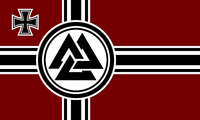Wehrmacht (Altenland): Difference between revisions
No edit summary |
No edit summary |
||
| Line 10: | Line 10: | ||
|commander = | |commander = | ||
|commander_title = | |commander_title = | ||
|branches = | |branches = {{flagicon_image|WehrmachtHelmetDecal}}[[Heer (Altenland)|Heer]]<br>{{flagicon_image|WehrmachtHelmetDecal}} [[Luftwaffe (Altenland)|Luftwaffe]]<br>{{flagicon_image|WehrmachtHelmetDecal}} [[Kriegsmarine (Altenland)|Kriegsmarine]] | ||
|age = 18-35 | |age = 18-35 | ||
|conscription = Limited | |conscription = Limited | ||
Revision as of 02:23, 16 December 2023
| Wehrmacht | |
|---|---|
| Defense Force | |
 Reichskriegsflagge, the war flag and naval ensign of the Wehrmacht | |
| Service branches | File:WehrmachtHelmetDecalHeer File:WehrmachtHelmetDecal Luftwaffe File:WehrmachtHelmetDecal Kriegsmarine |
| Headquarters | Hochstadt, Altenland |
| Leadership | |
| Commander-in-Chief | Martin Winter |
| Kriegsminister | Bruno Graf von Scharnhorst |
| Personnel | |
| Military age | 18-35 |
| Conscription | Limited |
| Active personnel | 900,000 |
| Reserve personnel | 800,000 |
| Related articles | |
| Ranks | Wehrmacht Ranks |
The Wehrmacht ("defense force") are the unified armed forces of Valkist Altenland. It consists of the Heer (army), Luftwaffe (air force), and Kriegsmarine (navy). The designation "Wehrmacht" replaced the previously used term Republikswehr and serves as the manifestation of the Valkist regime's efforts to rearm Altenland to a greater extent than the Treaty of Verdon permitted.
After the Valkists rose to power in 1929, one of Martin Winter's most overt and audacious moves was to establish the Wehrmacht, a modern and offensively-capable fighting force. In his first few years in power, Winter moved to violate most of Altenland's military restrictions by reinstituting conscription, expanding the size of the armed forces well beyond 150,000, constructing tanks and submarines, and forming an air force, the Luftwaffe, which was strictly forbidden by Verdon. This has required massive investment and defense spending on the arms industry.
WIP.